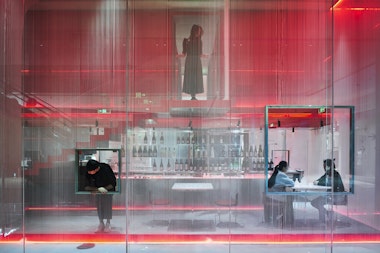Country or Region selection
Worldwide MSC International
Europe
NEW REPORT REVEALS PERSONALISED SMART CABINS, HUMAN-CENTRIC ENTERTAINMENT AND PURPOSEFUL TRAVEL AS GUEST EXPERIENCE TRENDS OF THE FUTURE
24/01/2020MSC Cruises, the world’s largest privately-owned cruise line, today reveals The Future of the Guest Experience, a forward-looking report that explores the trends that will impact the future of the travel industry. Created in partnership with The Future Laboratory, one of the world’s leading futures consultancies, the report identifies the ways in which travel and hospitality brands will have to deliver ultra-high definition (UHD) experiences to satisfy the needs of the guest of the future. Impacted by hyper-connectivity, urbanisation and demographic transformation, the report shows that the future for the cruise industry is full of challenges but more importantly opportunities.
Luxury will be hyper-luxurious, spas will be hyper-revitalising, entertainment will be 5D and beyond, and purpose-driven travel that enriches the lives and minds of guests will be the norm. Guests of the future will prize fluidity, freedom and cultural fluency whilst seeking out discovery and self-improvement. Travel brands will need to respond by providing experiences that resonate with individuals across a wider range of mindset and communicating new perspectives that help them grow and progress.
Mr Vago, MSC Cruises’ Executive Chairman said “One of the challenges of the cruise industry is that we need to design and build new ships that will still be cutting-edge for our guests 30 years from now. As such, innovation and consumer trends are at the very core of our DNA and we need to have a strong and clear vision for the future whilst combining this with timeless style. Through intelligent innovation and design, with strong commitment to sustainable travel, we will be able to facilitate all kinds of future experiences.”
Future guests will be looking for a truly personalised holiday experience and as we become more connected than ever before, technology will provide brands with the information needed to tailor experiences to the individual. The report demonstrates that the trend of Data ID Wallets will enable brands to create a truly dynamic, seamless and hyper-personalised guest experience. Cruise ships and resorts will themselves become data touchpoints, assessing guest behaviour to better inform the services offered. And AI assistants and wearables will continue to play an important role in meeting the needs of guests.
MSC Cruises is already leading the way in leveraging voice activated AI technology to provide a service to guests. ZOE is the world’s first virtual personal cruise assistant and was introduced on board in March 2019. Currently speaking seven languages, with more in development, ZOE will evolve to become an integral part of the cruise guest’s experience, anticipating needs and tailoring information according to each guests’ preferences.
Technology such as ZOE will also be key in facilitating the trend Subconscious Design, where responsive technologies will seamlessly alter environments to individual guests’ moods and emotions. The cruise cabin of the future could feature bio signal sensors that track heart rates and facial expression, adjusting light and temperature for maximum comfort. Or smart materials could act like living art, changing to create a visually immersive environment aligned with a guest’s emotional state.
Hyper-connectivity will also drive people to seek out human connection to avoid dehumanisation and so the trend of Anthropo-tainment will see human-centric entertainment that places people at the heart of the show, accessible to all ages, genders and nationalities. Driven by a hyperconnected world making travel more accessible, this trend will see entertainment breaking down geographical, cultural and demographic barriers.
The new Cirque du Soleil at Sea shows on board Meraviglia class ships bring all of these elements to centre stage. This unique form of live entertainment is a euphoric celebration of the art of human performance. All Cirque du Soleil at Sea shows are non-language specific which makes them accessible to all - breaking demographic barriers and giving them universal appeal. Their unbridled creativity, impeccable craftsmanship and commitment to originality is apparent in each one-of-a-kind production. While some shows, like EXENTRICKS, actively invite audience participation, all of them allow guests to experience imaginative freedom with emotional impact - a truly unique form of human interactivity for spectators.
As travellers become more and more conscious of the environmental impact of their travel and seek out eco-friendly holiday options the guest experience of 2030 will place a significant focus on sustainability, social impact and civic engagement.
Pierfrancesco Vago commented, “We’re inherently linked to the sea, and from this perspective there exists a big opportunity to play a big role when it comes to giving back to the environment and to the planet as a whole. We are the first cruise line to go carbon neutral across our marine operations and the emphasis that we place on our commitment to the environment is driven by not only our personal passion to protect the oceans but also the need to provide our guests with a sustainable way to travel.”
The desire for purposeful travel will also see the growth of Repurposed Resorts where hospitality brands will transform uninhabited or once-derelict spaces, boosting local economies by turning them into unique destinations.
Ocean Cay MSC Marine Reserve in The Bahamas is an example of one of these destinations. Formerly a sand excavation site, MSC Cruises has worked to transform this industrial site into an eco-friendly destination for guests. The island has been developed to create a positive long-term impact both in terms of the environment and the local communities of The Bahamas.
The island sits within 64 square miles of protected waters and the vision is to transform these waters into a thriving and flourishing marine reserve. A bio-centre will be established on the island to carry out critical research into coral health and restoration and plans are underway to develop an academic partnership with The University of The Bahamas. Ocean Cay has also created a positive economic impact with the restoration of the island by sourcing materials locally wherever possible and employing Bahamians during construction, and longer-term, the staff who live and work on the island includes full time Bahamian employees.
With the next decade set to be defined by consumers’ pursuit of personalisation, desire for conviviality and demand for purpose-driven experience, brands that deliver on these three fronts can create a guest experience that is truly ultra-high definition. The cruise industry will sit at the forefront of this transformation by embracing creative and future-facing innovations that push beyond the realms of what is expected. Once experienced, there will be no going back.
Télécharger
Contact
Wim Willems
Yasmine Dewaele


